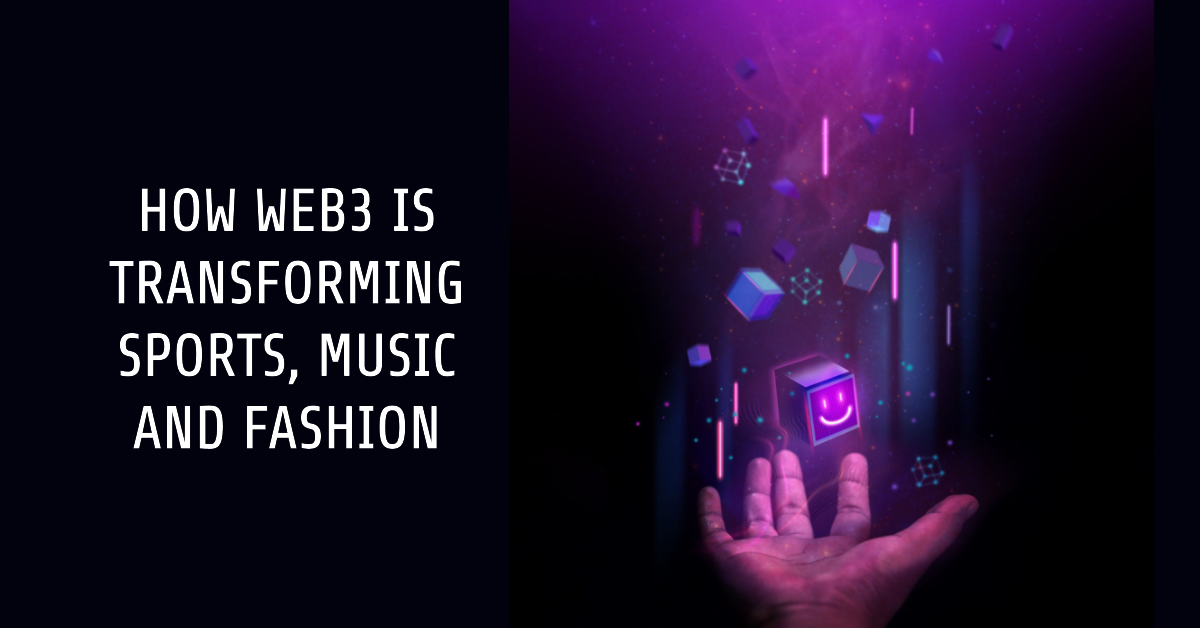
How Web3 Is Transforming Sports, Music, And Fashion
Introduction
Web3, also known as the decentralized web, is an emerging internet technology built on blockchain networks that are transforming various industries, including sports, music, and fashion. Through decentralized applications (dApps) and smart contracts, Web3 is revolutionizing these sectors by offering new ways to create, share, and monetize content, goods, and services. This article will explore how Web3 is reshaping sports, music, and fashion and discuss some of the most significant developments in each industry.
Web3 and Sports
Web3 is opening up new opportunities in the sports industry, particularly in the areas of fan engagement, sports betting, and digital collectibles. Some key developments include:
a. Fan Tokens and Governance: Decentralized platforms such as Socios and Chiliz allow sports clubs to issue their own digital tokens, enabling fans to have a say in club decisions, access exclusive content, and participate in various club-related activities. This fosters a stronger connection between clubs and their supporters, giving fans a more significant stake in their favorite teams.
b. Sports Betting: Decentralized sports betting platforms like Augur and SportX offer a transparent, secure, and trustless environment for placing bets on sports events. These platforms leverage smart contracts to automate the betting process, eliminating the need for intermediaries and reducing the risk of fraud.
c. Digital Collectibles: Non-fungible tokens (NFTs) have gained popularity in the sports industry, with leagues and clubs issuing limited edition digital collectibles that fans can buy, sell, and trade. NBA Top Shot and Sorare are examples of platforms offering sports-related NFTs, providing fans with a new way to engage with their favorite athletes and teams.
Web3 and Music
Web3 is revolutionizing the music industry by addressing issues such as artist compensation, copyright management, and fan engagement. Key developments in the music industry include:
a. Direct-to-Fan Monetization: Decentralized platforms like Audius and Opulous allow artists to sell their music directly to fans, bypassing intermediaries and earning a more significant share of revenue. Additionally, artists can issue their own tokens, enabling fans to invest in their favorite musicians and share in their success.
b. Copyright Management: Blockchain technology enables artists to register and manage their copyrights more efficiently, ensuring they receive fair compensation for their work. Companies like Ujo Music and Mycelia are developing decentralized copyright management systems that streamline royalty payments and licensing processes.
c. NFTs and Digital Collectibles: Musicians are embracing NFTs to release limited edition digital collectibles, such as album covers, virtual merchandise, and even virtual concert tickets. These digital assets provide a new revenue stream for artists and offer fans a unique way to support and engage with their favorite musicians.
Web3 and Fashion
The fashion industry is undergoing a transformation as Web3 technologies enable new business models and creative opportunities. Key developments in the fashion industry include:
a. Digital Fashion and Virtual Goods: With the rise of virtual reality and metaverse platforms, digital fashion is becoming increasingly popular. Brands like Gucci, Nike, and Balenciaga are creating digital clothing and accessories that can be purchased as NFTs and worn in virtual worlds, opening up new markets and revenue streams.
b. Supply Chain Transparency: Blockchain technology can help improve supply chain transparency and sustainability in the fashion industry. Companies like Provenance and VeChain are developing solutions that track garments from production to sale, providing consumers with more information about the origins of their clothing and helping to combat issues like counterfeiting and unethical labor practices.
c. Tokenization and Ownership: Web3 enables the tokenization of physical fashion items, allowing users to prove ownership, authenticate their products, and trade them more easily. Platforms such as LUKSO and Curio are creating blockchain-based solutions for tokenizing fashion items, which can help combat counterfeiting and increase the value of rare and unique pieces.
d. Crowdfunding and Fashion Startups: Decentralized platforms are offering new ways for fashion startups to raise capital and engage with their customers. Projects like Storinka and Reflaunt allow fashion brands to issue tokens, enabling supporters to invest in their favorite designers and share in their success.
The Future of Web3 in Sports, Music, and Fashion
As the adoption of Web3 technologies continues to grow, we can expect to see even more innovation and disruption in the sports, music, and fashion industries. Some potential future developments include:
a. Greater Integration of NFTs: NFTs are likely to become an increasingly integral part of the sports, music, and fashion industries, with more brands and individuals embracing digital collectibles and virtual goods as a way to engage with fans and generate revenue.
b. More Decentralized Platforms and Applications: As Web3 technologies mature, we can expect to see more decentralized platforms and applications emerge, offering new ways for creators, consumers, and businesses to interact, collaborate, and transact.
c. Cross-Industry Collaboration: As Web3 breaks down barriers between industries, we may see more collaboration between sports, music, and fashion, resulting in innovative new products, services, and experiences that merge elements from each sector.
d. Increased Focus on Sustainability and Ethics: Web3 technologies can help make industries like sports, music, and fashion more sustainable and ethical by improving supply chain transparency, reducing waste, and empowering creators and consumers to make more informed choices.
Conclusion
Web3 is transforming the sports, music, and fashion industries by offering new ways to create, share, and monetize content, goods, and services. As these technologies continue to evolve and gain traction, we can expect to see even more significant changes in how these industries operate and interact with their audiences. By embracing Web3, sports, music, and fashion stakeholders can leverage the power of decentralized networks and smart contracts to create more equitable, transparent, and engaging experiences for creators, consumers, and businesses alike.
